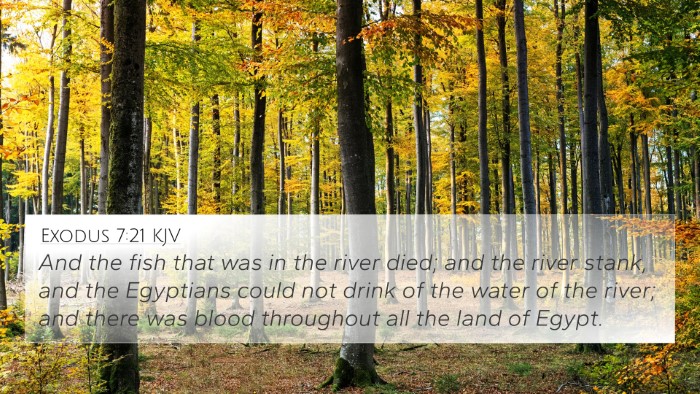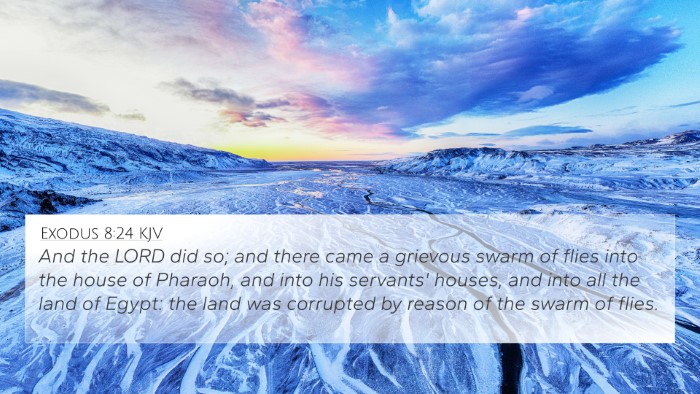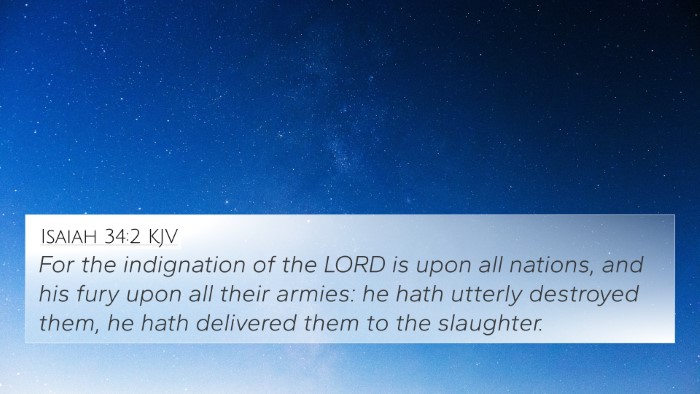Exodus 8:14 - A Comprehensive Analysis and Interpretation
The verse Exodus 8:14 states: "And they gathered them together upon heaps, and the land stank." This verse occurs during the series of plagues that God sent upon Egypt as a consequence of Pharaoh's refusal to release the Israelites from slavery.
Contextual Overview
The broader context of Exodus 8 involves the plague of frogs, which God sent as a judgment against Egypt's gods. The verse illustrates the aftermath of God's miraculous act, emphasizing both the physical and spiritual consequences of disobedience.
Commentary Insights
Analysis from Matthew Henry
Matthew Henry emphasizes the repugnant outcome of Pharaoh's hardened heart. He notes that despite the miraculous signs, Pharaoh continues to resist God's command, leading to dire consequences not only for the Egyptians but also for the land itself.
Analysis from Albert Barnes
Albert Barnes discusses the significance of gathering the frogs and the smell that ensues. He points out that the foul odor serves as a tangible representation of sin and the burden of rebellion against God. The heaps of dead frogs convey the reality that disobedience leads to decay and corruption.
Analysis from Adam Clarke
Adam Clarke elaborates on the idea that God's judgments serve not just to inflict suffering but also to demonstrate His power and authority. He argues that the piling up of frogs symbolizes the ultimate breakdown of Egyptian society and the futility of their gods, who could not save them from these calamities.
Thematic Connections and Cross-References
This verse can be cross-referenced to enhance understanding and show the connections between various Biblical themes. Here are several related passages:
- Exodus 7:27-28: Addresses the initial plague and Pharaoh's hardened heart.
- Exodus 8:1-2: The command from God to Pharaoh to release the Israelites.
- Psalm 105:30-31: Reflects on God's miraculous signs and dealings with Egypt.
- Romans 1:18: Discusses God's wrath against humanity's wickedness.
- 2 Chronicles 36:16: A warning about ignoring God's messengers.
- Matthew 24:7: Speaks to the universal impact of sin and disobedience.
- Revelation 16:3: A final comparison of divine judgment pouring out upon the earth.
Understanding the Implications
When looking at Exodus 8:14, it becomes clear that the gathering of frogs leading to decay signifies spiritual truths. God employs the natural world to communicate divine realities, reminding us that dishonoring Him carries consequences not just temporally but also spiritually.
Practical Application and Study Methods
For those wishing to deepen their understanding of scripture, tools for Bible cross-referencing can greatly enhance study. Here are some methods and resources to consider:
- Bible Concordance: A comprehensive guide to find keywords and their occurrences throughout the Bible.
- Cross-Reference Bible Study: A structured approach to studying related texts thematically.
- Identifying Connections: Look for thematic links between the Old and New Testaments to gain a fuller picture of doctrinal continuity.
- Bible Reference Resources: Utilizing digital tools or physical reference books to track cross-references.
- Inter-Biblical Dialogue: Exploring how different books of the Bible converse with each other on similar themes.
Conclusion
Exodus 8:14 highlights a critical point in the narrative of Israel's liberation, illustrating the profound impact of Pharaoh's obstinacy. This serves as a reminder of the broader spiritual principles at play: God's authority, the consequences of disobedience, and the hope of redemption. By engaging with this verse and its connections to other scriptures, believers can deepen their understanding of God's character and His dealings with humanity.







